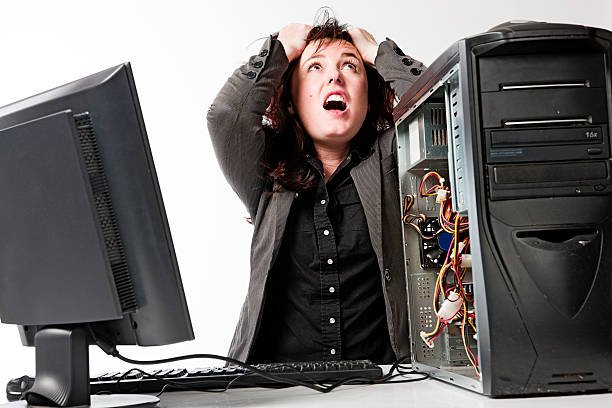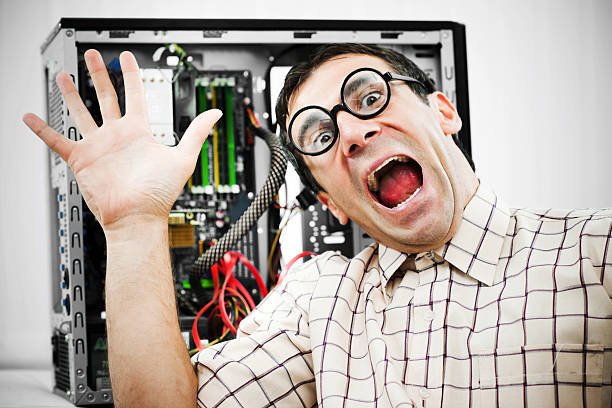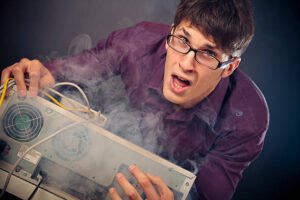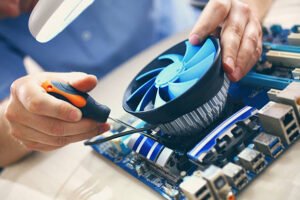Why Does My PC Keep Crashing
It’s frustrating. During your work on a project or gameplay or your online browsing, the unfortunate happens when your computer freezes. Everything goes black or freezes. The incident makes you wonder if it was unique only to experience disappointment in the next moments. After facing this situation, you must be asking yourself, why does my PC keep crashing? This problem may develop for various causes, although this article will describe these reasons.

The below guide provides comprehensive information about computer crash causes along with their primary symptoms and solutions for common system failures. After providing PC repair and optimization assistance for more than ten years, I will present approaches that match realistic situations better than technical information.
The operating system failure that results in an absolute system breakdown and then triggers an automatic system recovery process is known as a PC crash.
When people ask, “Why Does My PC Keep Crashing?” People normally imagine that an organization consists of only one aspect. Several hardware issues and software conflicts alongside temperature pressure and file compression and inadequate drivers might lead to system crashes. The computer displays three possible signs of failure called blue screen, restart, and user interface freeze and power shutdown.
Some drives require additional time to experience a system failure when compared to others. System fixing requires identifying the exact origin of underlying issues to establish proper solutions.
1. Overheating: The Silent System Killer
Overheating stands out as probably the most prevalent cause behind ‘Why Does My PC Keep Crashing?’ due to its common situation. Extended gameplay and video editing activities produce intense heat in modern personal computers.
The computer system freezes as a protective measure to avoid more sophisticated system damage when CPU or GPU temperatures reach dangerous levels. Heat problems in computers trigger fan noise while computers abruptly shut down and the case remains overly hot to the touch.
Solution:
- Ensure your PC is well-ventilated.
- Vacuum or wipe fans and vents.
- One of the rare cases that leads to extended CPU usage is the requirement for thermal paste rewriting.
- Consider installing additional cooling solutions.
2. Failing Hardware Components
The issue of computer crashes appears mainly because of infected files together with corrupt RAM, hard disk deterioration, and bad RAM. Hardware failure remains one of the potential causes when a PC randomly freezes after you execute fresh software installations and system resets.
The number of machines I have built since starting, along with my machine repair work, reaches exactly 15 units, which demonstrates why RAM problems are more common than many believe. Memory sticks tend to unexpectedly freeze before rebooting as one of their frequently observed issues.
Solution:
- You should use various testing tools to execute RAM tests that evaluate your system’s RAM performance.
- Users can run diagnostic tests through two built-in tools, including Windows Memory Diagnostic and MemTest86.
- The check disk requires execution through the CHKDSK utility along with the usage of alternative third-party tools.
- The craft might require replacement of particular defective parts.
3. Outdated or Corrupted Drivers
All computers require drivers since they connect the operating system to the hardware components. When your system experiences recent updates, the built-in drivers can develop issues that trigger your doubts about their operation.
The continuous development of graphics card drivers causes crashes, which occur because users fail to maintain regular updates.
Solution:
- The Device Manager utility of the Windows system displays driver lists while identifying outdated drivers within your system.
- The official websites of NVIDIA, AMD, and Intel feature the latest information regarding their graphics cards since these companies represent the main manufacturers.
- The majority of third-party driver software platforms create problems for personal computers through their unreliable operational behavior.
4. Malware and Viruses
Spoiled computer systems are a common effect of malware execution. Virus situations cause unwanted and dangerous interference that makes any user wish to avoid them completely. Users who spot system irregularities or system crashes should wonder about the root cause of these problems.
Solution:
- Use the default system antivirus and its deep scanning abilities, which, within this PC, operate as Windows Defender or a different trusted antivirus program.
- Remove suspicious software or extensions.
- The solution must stop detection of threats before new occurrences happen.
5. Power Supply Problems
Generally unknown but critical to every PC, the power supply unit serves as an essential component, which the community labels as PSU. The system occasionally freezes during operation, and the worst occurrences result in random restarts of active applications when individuals play games or multitask.
Most college students are unaware of the existence of PSU issues, although I can confirm these problems stand as a genuine solution to eliminate Why Does My PC Keep Crashing symbols.
Solution:
- Testing the PSU watts against peripheral demands ensures enough energy will reach your components before choosing a final product.
- Replace outdated, unverified power supply units with ones produced by well-known brands.
- Rejecting power outages is essential for the system through connecting a UPS device because power surges and continuity problems can occur due to a power interruption.
6. Software Conflicts and Incompatible Programs
Operating dual system utilities or antiviruses from one computer will lead to interference between them. A system instability ensues from this situation, leading your system to crash frequently.
After dedicating numerous years to client machine troubleshooting, I learned that widely used programs can create system instability when not set up correctly.
Solution:
- Uninstall unnecessary or duplicate programs.
- Perform clean boot procedures to detect conflicting software programs.
- All users should maintain the latest version for every accessible software.
7. Operating System Issues
The computer software installed by the operating system serves as the source of certain problems. Multiple types of software corruption, together with system file problems, broken updates, and missing applications, can detrimentally affect your computer. A star symbol, ‘Why Does My PC Keep Crashing after a Recent Update Check, can suggest the reason for the issue.
Solution:
- The built-in System File Checker (SFC) allows you to perform a file check for damaged components.
- Roll back to a previous system restore point.
- Your last course of action should be performing a clean Windows install if all other solutions fail to resolve the problem.
8. BIOS or Firmware Issues
EIS settings produce crashes only during specific instances of wrong or old configurations. The dissuasion applies most likely to computers built from parts, including recently installed system components.
Solution:
- Booting into the computer needs to allow access to the BIOS settings for users to reset default configurations.
- You should visit your motherboard manufacturer’s website for updating BIOS software through their site.
- You should only update BIOS when it is essential according to professional advice because such changes will significantly impact system performance.
9. Running Too Many Background Processes
System crashes can happen when it runs out of memory or when CPU utilization becomes excessive and remains high, thus leading to system failure. The same issue happens even in modern systems whenever different processes attempt to launch simultaneously.
Solution:
- Users should navigate to Windows Task Manager to inspect resource consumption rates.
- The following steps should be taken by users: They need to disable unused start-up applications when powering up their computer system.
- Add more RAM if needed.
10. Aged Parts Stand Alone Since Both Time and Lack of Rehabilitation Exist
The normal wear of your system throughout five years of existence could potentially cause your system to pull away from stability. People typically state, “Why Does My PC Keep Crashing?” because of three potential main factors, including lens deterioration, capacitor degradation, dust accumulation, and drive degradation, as well as reduced disk rotation speed.
Solution:
- Another alternative addresses the upgrade of specific components, including RAM or solid-state drives.
- Perform regular maintenance and backups.
- Your system should be replaced when repairs prove both common and financially burdensome.
Conclusion: Be Informed and Always on Top of Things
So, why does my PC keep crashing? Through this explanation I show that complete solutions exist for none of the problems presented. Personal computers experience a wide variety of faults from both hardware and software sources and also suffer from overheating as well as being victims to viruses.

Asset maintenance and timely updates combined with signal recognition have always been part of my experienced user approach. The majority of crashing problems will resolve if users provide proper care during prevention stages before explosions occur.
FAQs
A virus can transform my PC into a state where it faces recurring system crashes. How?
Viral infections lead to continuous system crashes because they either modify essential system files or consistently exhaust all resources on the computer.
Which procedures can I use to discover why hardware components trigger crashes?
Diagnostic tools should be used to check both RAM state and CPU state and hard drive state during the inspection process. A clean OS re-installation proves necessary to verify OS-free crashes because hardware issues would be verified if crashes endure after OS replacement.








